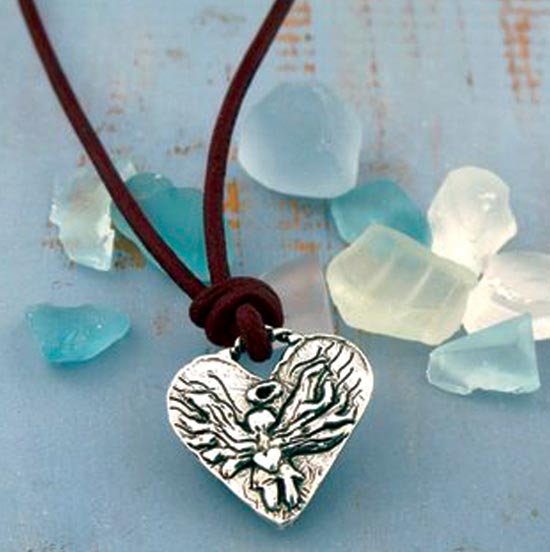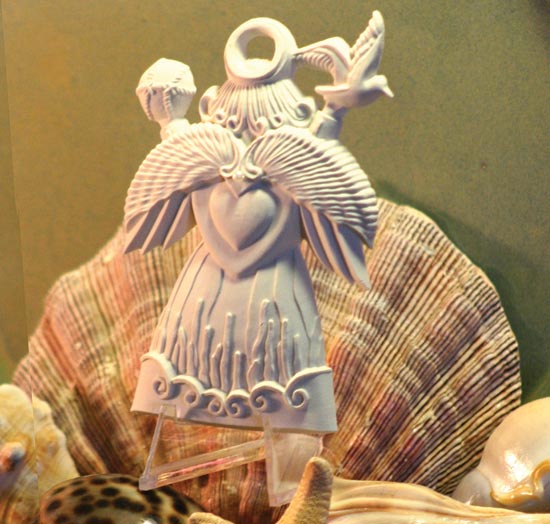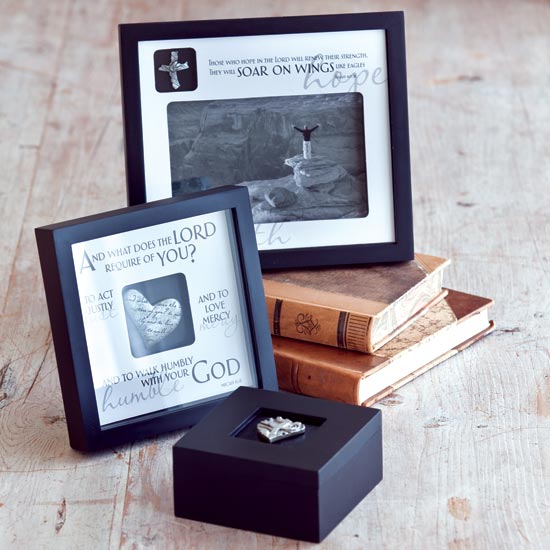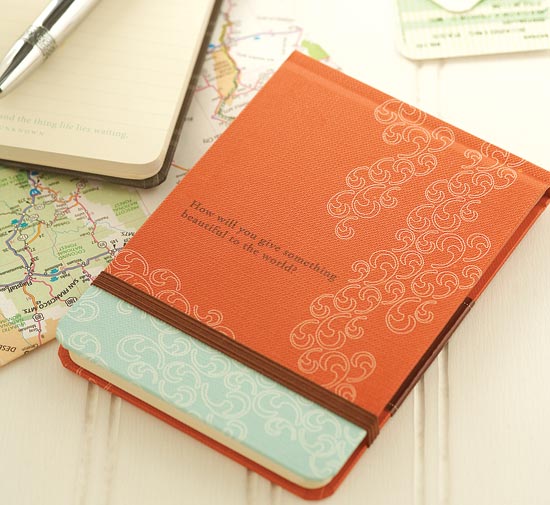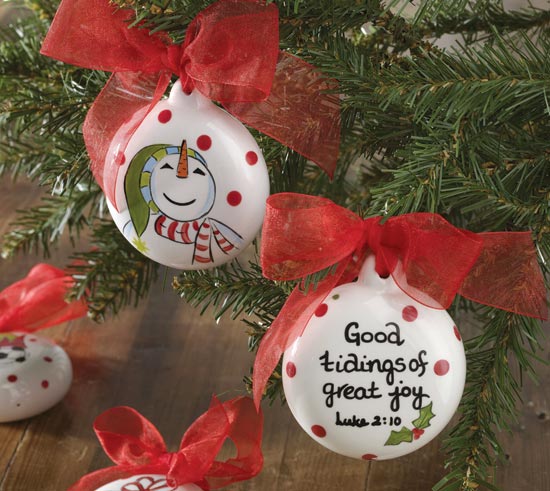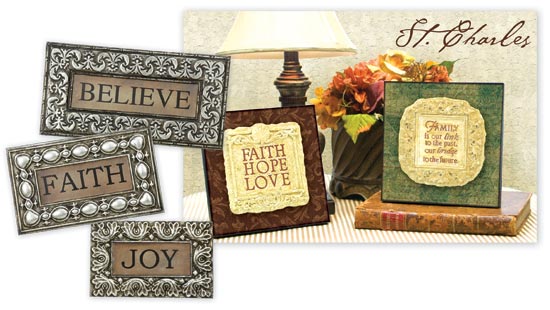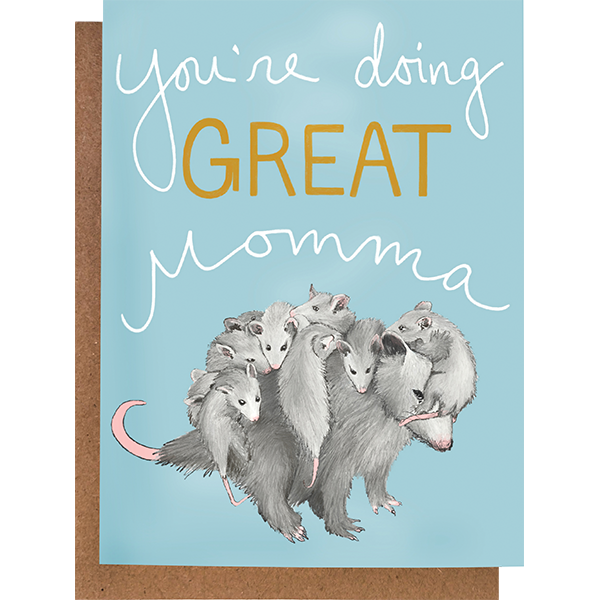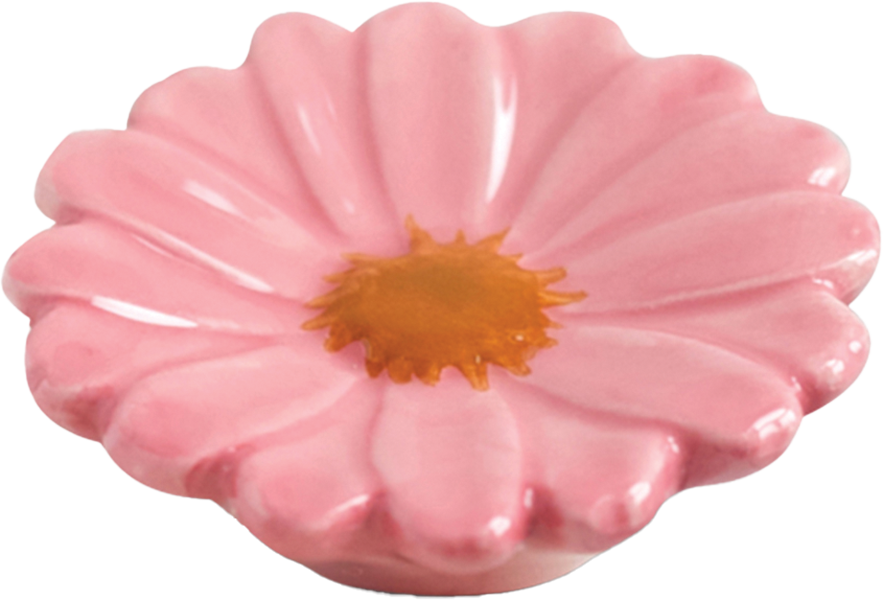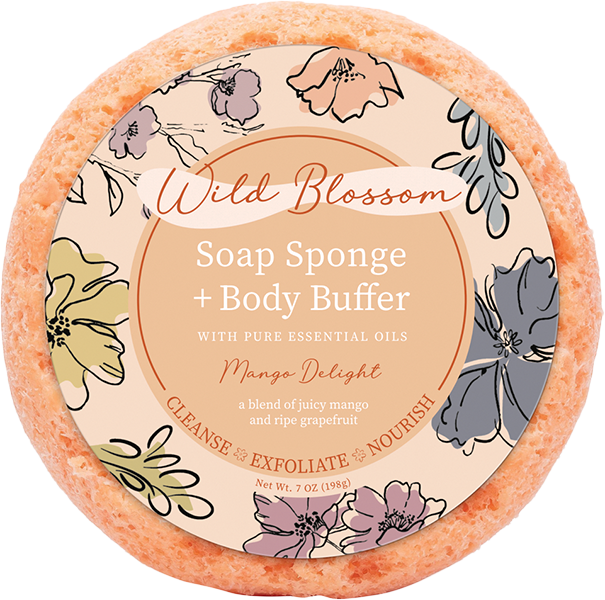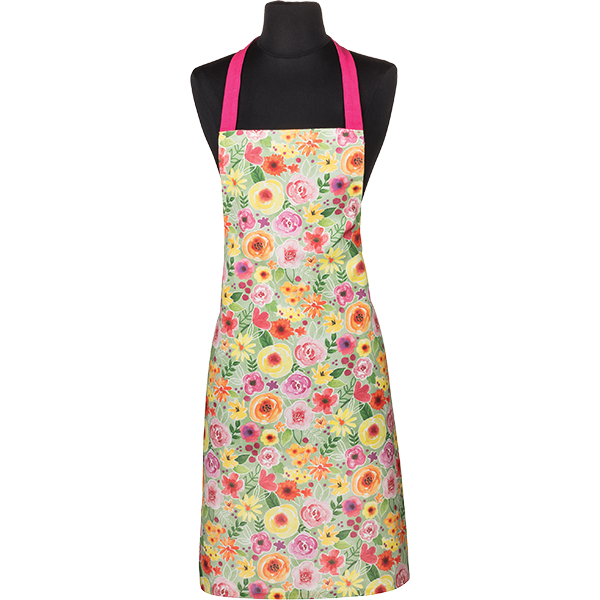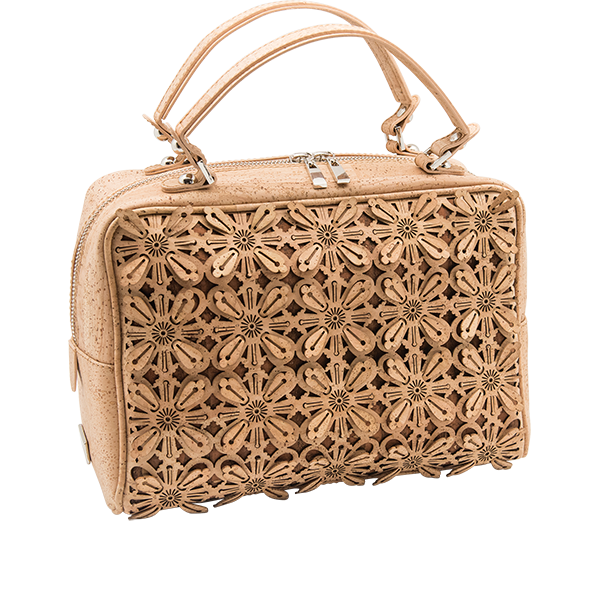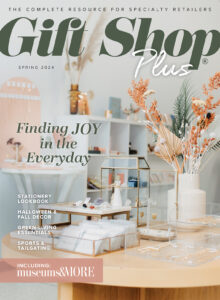A Glimmer of Hope
The Store as Refuge
Despite a slow start to the year, retailer April McCrumb is happy that sales at her gift shops, Catching Fireflies, seem to be picking up again. Catching Fireflies has two locations in Berkley and Rochester, in Michigan. “One can only live on doom and gloom for so long,” she points out, adding that her customers are increasingly picking out inspirational gifts.
Scott Testa, a professor of marketing at St. Joseph’s University in Philadelphia, says there is a real market for inspirational products when the economy is bad. “These products help solve some of the feelings of worry,” he says. He adds that an inspirational product is something that lifts morale and is not necessarily associated with any particular religious belief.
This need to seek out hope has allowed inspirational products to expand from their original distribution points—traditionally religious markets—to more mainstream ones, explains Lynn Switanowski-Barrett, founder of Creative Business Consulting Group in Boston. “Most gift stores, card stores, and even other retailers such as jewelry and apparel stores can cover this category with the broad range of products available today,” she says.
That’s what the managers of Global Gifts in Indianapolis, IN, have found. While the store has a section of Christian-oriented products, it carries a much broader range of general inspirational gifts, according to manager Robin Hill. She adds that the inspirational items are popular purchases, as customers want to give a struggling friend an uplifting gift.
A popular item at Global Gifts is a small rock with single words printed on them. ‘Love’ and ‘Peace’ stones have been big sellers for a while, but Hill says that ones saying ‘Strength’ and ‘Hope’ have also sold well recently. While she attributes the popularity of “Hope” to the new president and his campaign message, Hill also believes that those in the middle of hard times find inspiration from it.
Global Gifts general manager Sam Carpenter adds that many of their customers aren’t merely looking for inspirational products to buy—they also want a place where they can relax and find a sense of calm. He says it isn’t uncommon for people to spend an hour or more in the store and believes the kind of products his store sells, are a reason his and other shops that focus on the inspirational market, are faring better than other retail right now.
Focus on demographics
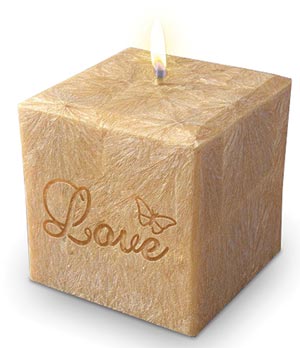 Switanowski-Barrett says that stores that create such a refuge for customers either through their merchandising or through in-store events are poised to do well in this market. She encourages retailers to focus on consumer trend data and adopt new products as their customer demographics change. “Failing to focus on changing consumer needs can be detrimental for any store and especially challenging for religious/inspirational shops with small target markets to begin with,” she says.
Switanowski-Barrett says that stores that create such a refuge for customers either through their merchandising or through in-store events are poised to do well in this market. She encourages retailers to focus on consumer trend data and adopt new products as their customer demographics change. “Failing to focus on changing consumer needs can be detrimental for any store and especially challenging for religious/inspirational shops with small target markets to begin with,” she says.
This is the approach of Catching Fireflies where owner April McCrumb recognizes the types of items her customers are looking for and caters to that market. The inspirational gifts her store sells range from cards and magnets to items that focus on relationships.
Currently, she sees a trend toward gift items with inspirational words. “Items with uplifting messages makes customers happy,” McCrumb says. And if you can make them smile, chances are they’ll return to the store.
The product range
Gratefulimages, located in Houston, is owned and operated by artist Emily Beynon and her two daughters, Megan and Julia. The company wholesales stationery and other gift items that feature the watercolor paintings of Emily and the photography of Julia.
The majority of inspirational products are geared for women because, says Elizabeth Trask, marketing coordinator for Gratefulimages, “women do most of the shopping and are usually more inclined than men to talk about their faith.”
“Our customers connect deeply with our art because it speaks to their soul,” says Trask. “Trying times are often when people grow the most spiritually. Times like these really make people realize what is important in life—faith, family, and love. When love is the most important, people will give of themselves (even if money is tight) to share that love with others.”
Suzy Toronto, based in Mt. Dora, FL, targets nearly all of her products at women. Toronto’s products feature paintings of women, all bright and colorful and printed on T-shirts, note cards, memo pads, coasters and bookmarks, among other products. Her items focus on uplifting women and the different relationships women have. As someone who considers herself to be a spiritual, faith-based individual, Toronto wanted to share her love and recognition that all good things come from God, but that shoving her ideas down someone’s throat was not going to be the best way to do it. “Instead I strive to have all my work testify of the goodness of God and help people recognize what I call ‘the light within them’ even if society has somehow jaded their view of faith, religion or God,” Toronto says.
This “soft sell” technique has worked well for her.
Religion’s role
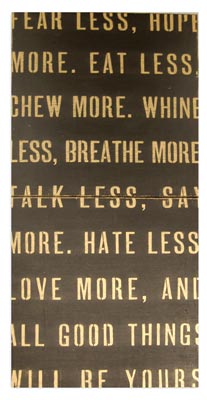 At wholesaler Kerusso, in Berryville, AR, the inspirational focus is based on religious faith. “People want to share their faith in a very public way and they want to do it in creative and innovative ways,” says Chris Rainey, vice president of marketing for the company, which sells T-shirts in addition to other products. “T-shirts and other religious products are a perfect way to give voice to what people hold dear in their hearts,” Rainey says.
At wholesaler Kerusso, in Berryville, AR, the inspirational focus is based on religious faith. “People want to share their faith in a very public way and they want to do it in creative and innovative ways,” says Chris Rainey, vice president of marketing for the company, which sells T-shirts in addition to other products. “T-shirts and other religious products are a perfect way to give voice to what people hold dear in their hearts,” Rainey says.
According to a 2007 study by Christian Bookstore Association and Christian Retailing, the $4.6 billion inspirational product market is comprised of Bibles, books, music, gifts, greeting cards, toys and apparel. Rainey points out that while there are thousands of different types of products in these categories, over the last several years, apparel and general gifts have especially enjoyed significant growth. “This growth has been primarily because gift and apparel margins are much greater than other categories,” Rainey says.
Psalm 23 Jewelry in Rancho Cucamonga, CA, pulls its inspiration from the most recognized and well-loved chapter in the Bible (the one that begins “The Lord is my shepherd; I shall not want”). The company got its start when Laura Kramer wanted to memorize the verses of the Psalm, and she created a bracelet made of sterling silver with Swarovski crystals that helped her focus. The bracelet works like rosary beads: Laura used the different colored beads on the bracelet to represent a different verse and she’d use that color association to remember the verses. Laura Kramer is the designer for Laura K Designs, which creates the Psalm 23 Jewelry.
The bracelet remains the company’s best-selling item, according to marketing director Gerhard Kramer. Psalm 23 Jewelry also offers rings, pendants, dog tags, and crosses that all feature the Psalm in some way. For example, Kramer says, there is the “Fear no Evil” ring for men and women, which emphasizes one of the most powerful passages in the Psalm.
“Our items sell best in places where inspiration is encouraged and needed, such as hospital gift shops,” says Kramer.
Although religious merchandise can—and does—cover all religions, it is most often associated, at least in North America, with Christian denominations. Vendors like Kerusso and Psalm 23 Jewelry, whose focus is on religious items, say that while their products are popular across the country, they sell best in the traditional Bible Belt region of the Southeast and southern states.
Jewelry sparkles
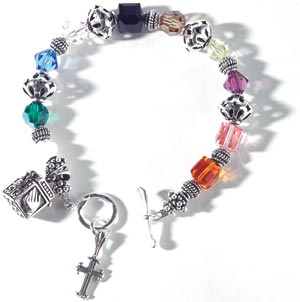 As the case of Psalm 23 shows, jewelry is a popular inspirational product. Another wholesaler, Alexa’s Angels in Windsor, CO, is a jewelry company with a focus on inspirational designs. Among its popular sellers is the “Many Hearts One Family” necklace with a heart on one side of the pendant and a tree with many branches on the other. It comes with a poem that outlines the importance of family.
As the case of Psalm 23 shows, jewelry is a popular inspirational product. Another wholesaler, Alexa’s Angels in Windsor, CO, is a jewelry company with a focus on inspirational designs. Among its popular sellers is the “Many Hearts One Family” necklace with a heart on one side of the pendant and a tree with many branches on the other. It comes with a poem that outlines the importance of family.
“Through our jewelry, we hope to promote connections between individuals as well as [foster] a sense of well-being among women,” says Beth Lang, founder of the company.
Through sickness and in health
Sometimes a product line comes from the creator’s own need for inspiration. When Beth Brownlee, one of the founders of Trust Your Journey in Reno, NV, developed breast cancer, friends used that phrase, “Trust Your Journey,” to help her survive. It was also a phrase she used when a friend’s husband passed away and she became a single mom. Brownlee and her friend decided to launch this company as a way to celebrate their strengths and to help other women celebrate their own lives, no matter where the path led.
Brownlee says that the products her company sells, all with the Trust Your Journey logo, do have some focus on breast cancer survival and single motherhood, but she feels all women can find inspiration from the message.
“Women like to have tokens that reaffirm where they are in life,” says Brownlee, “and they want to feel good about what they buy.” Brownlee adds that all items are eco-friendly increasing their appeal to potential customers.
Adults aren’t the only ones who need inspiration. One World Kidz bears were developed as a way to provide a spiritual outlet for children.
“We believe that the caretakers of children of all ages do not have a lot of options when looking for a unique gift already packaged with an inspirational message at an attractive price,” says owner Lee Sullivan. “Our products are for children, but we like to make clear that they are for children of all ages. Our Blessing Bear is a great baby gift but we have had many customers buy them for older children, as hospital stay gifts or for those times a child may need an extra reminder of the love there is in the world.”
Sullivan plans to add two new bears to her collection: Wishing Bear, which encourages wishing on dreams, and Precious Bear, which will help boost a child’s self-esteem.
Why inspiration now
“Everyone needs a little encouragement now and then, but especially [now] when things are so uncertain in the world,” Beth Lang says. “I think that even when people are watching their money so closely, a personal, well-meaning little gift is just the ticket rather than just buying a gift that is more frivolous,” she adds.
Switanowski-Barrett agrees and believes this is why inspirational items are selling even when consumers are cutting down on other types of purchases. “People are looking for hope in any way possible,” she says. “While their situation at work, home or with their family may be challenged, shopping provides a way for consumers to perhaps forget, even briefly, their issues and think about brighter days. Having inspirational products in your store can help meet this consumer need.”
Mouse over images below to view.


